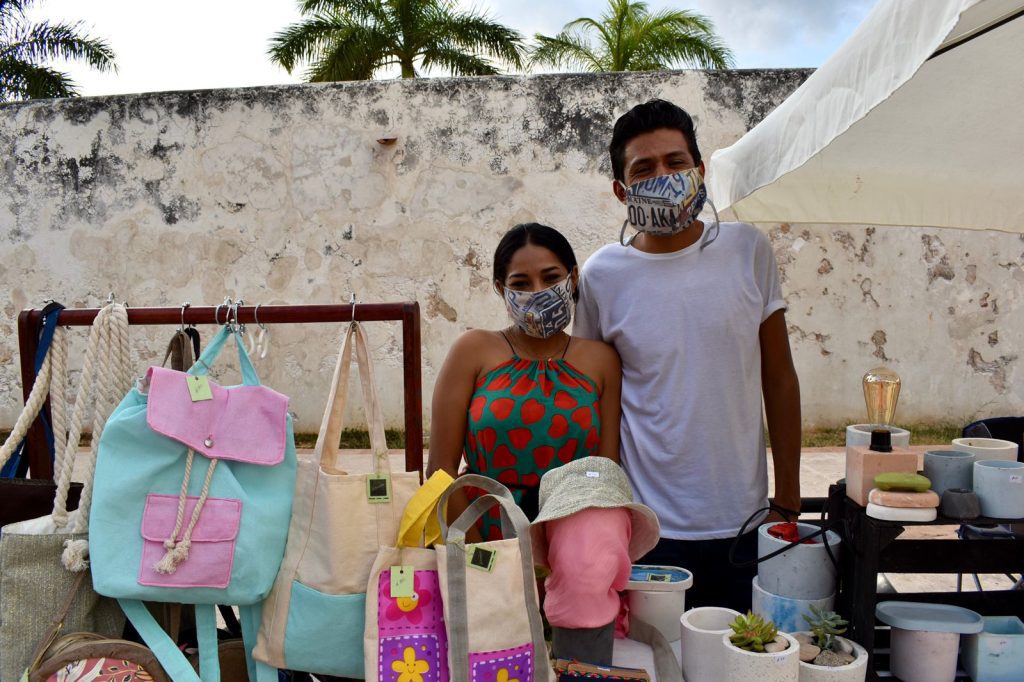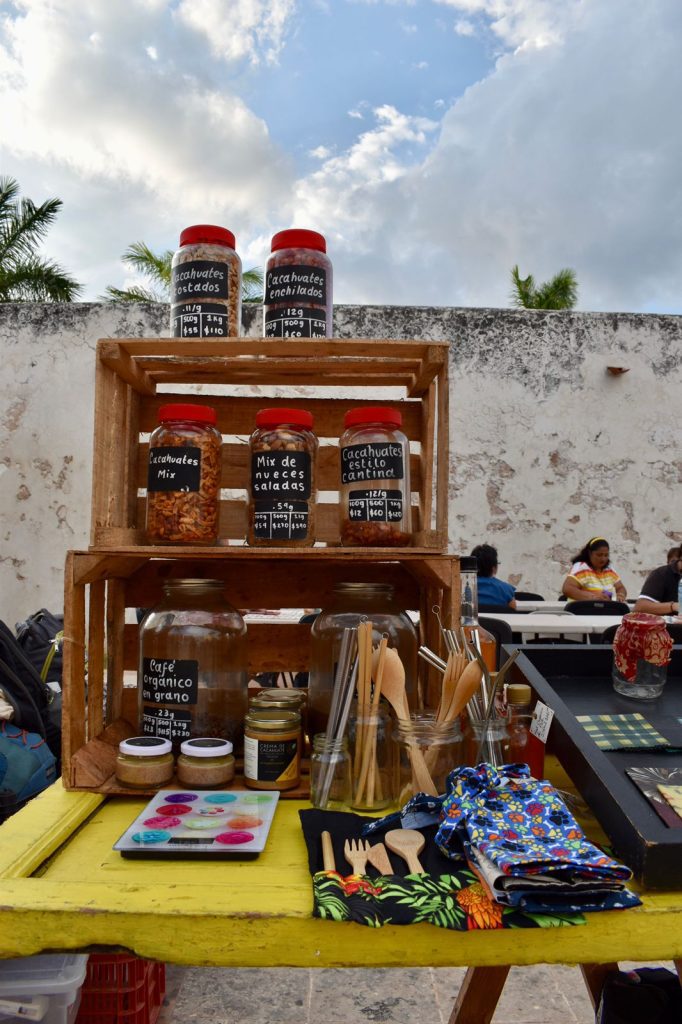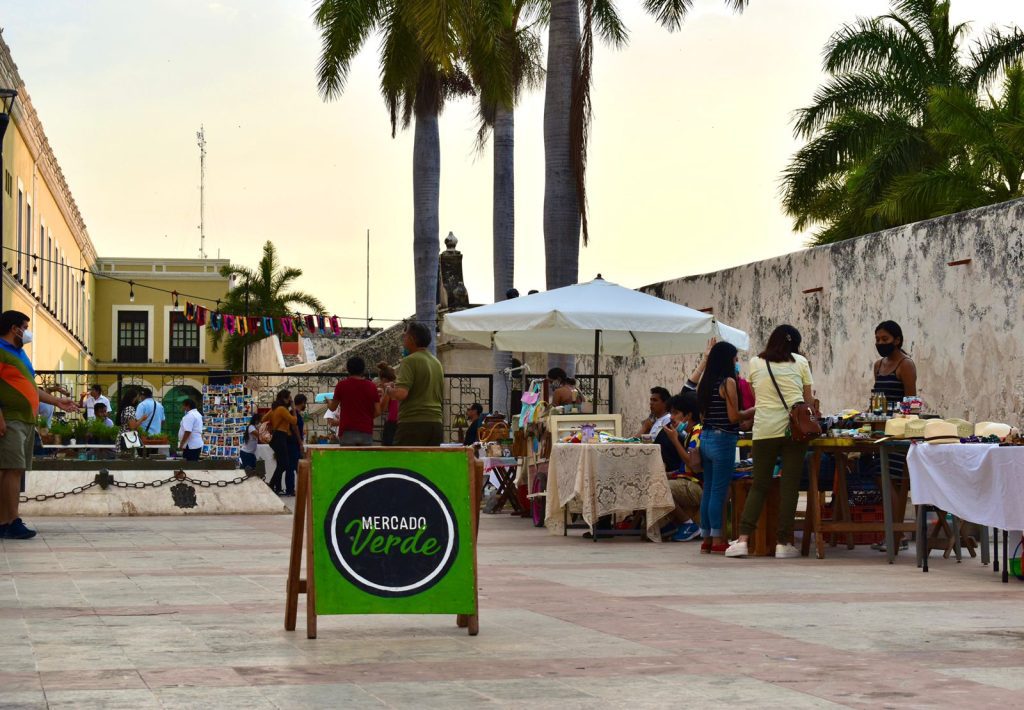From colourful colonial buildings, to impressive historical architecture, Mexico’s Campeche stands as a lesser-known culture hub on the Yucatan Peninsula. Unbeknownst to many, however, in recent years this quiet maritime city has become a bubbling centre for sustainable change.
Deep within the structure of this quietly energetic city lies an ever-growing community of forward thinkers. With the help and support of collective initiatives, the people of Campeche are expanding their minds to the many ways in which their community can lead a more environmentally conscious life.
Since 2014, Campeche’s Mercado Verde (Green Market) has sat at the heart of the movement. Local producers from across the city come together as the sun sets on weekends to create a space for mutual growth and the development of their micro-businesses. With a base in conscientious ideals, the market aims to rethink consumption, and question notions of the global marketplace. Local artisans, producers and entrepreneurs trade amongst themselves and with the public, as the focus is shifted towards forming meaningful relationships within the city. One may think of this as a regression, but putting the focus back on intimate community ties is what has empowered the people of Campeche in their sustainable journey.

Belynda Díaz, an integral member of today’s Mercado Verde, has an innate focus on sustainable menstruation. Through her brand, La Pañalería eco-boutique, she sells sustainable menstrual products with the aim of empowering people who menstruate to take ownership over their bodies in a way which is conscious of and in step with the environment. “I began selling the idea that this isn’t about me; it’s better for the environment, your health, and your budget. I’m convinced of the comfort of these products, and the environmental benefits supplement that.” She goes on to explain the obstacles she has faced throughout her company’s journey. “I would say the greatest resistance I have felt is through a perception of grossness, so I try to educate the community that our blood is not dirty. It’s about changing misconceptions and being understandable that it’s a taboo because of these women’s own stories.”
The market started out as a space which would allow for producers to sell directly to customers and avoid the vampirism of the middle man. Referred to as ‘coyotes’ across southern Mexico, these individuals and corporations impede the fair trade system by selling local producers’ products for a very small return to the producer. This means that these small businesses never have the opportunity to grow, and the producers cannot earn a living wage. Now, with their own space and a strong sense of community, local entrepreneurs at the Mercado Verde receive a fair price for their produce, and are empowered to move forward with their businesses.
As the community grew, it became evident that green values had to be integrated into the ethos of the initiative. Local producers had become a part of the fair trade system, so it was important that the produce being sold followed suit. So, not only were goods made locally, but they became linked with a greater environmental consciousness, as displayed through the market’s success in becoming single use plastic free in 2018. Carlos Callejas Ramirez, a local plant expert and active participant in his community, echoes these thoughts. “The green market has formed an important part as a platform to publicise and market my products. The people who know the place know that it is a market with values, and that allows me to give a fairer value to my products.”

Yutemania, founded by Sarahi González, is one of the many sustainable businesses at the market. González works specifically with the material jute, which allows her to create beautiful bags without the guilt of environmental damage. “Yutemania aims to make all kinds of bags in an ecological way, eliminating the use of plastic materials by using the natural fiber jute as the main material,” she explains. “To start the creative process we select the jute, we reinforce it, and we begin to sew it with extreme care. We shape the design; some we paint by hand, others we have embroidered or customised to the taste of our customers. This is something we love to do, since it allows us to really include our customers in the community, making them a part of the change.”
González talks highly about her community, explaining the impact it has had not only on her working life, but also on her world at home. “The experience has been very special,” she shares with a smile. “We have found the perfect place to positively impact the community with our products. I believe that being within a conscious community with an environmental focus has helped us on our path. We have learned to take care of our food, and the products of the house, and this is something that we take to our families, and it becomes a chain of good habits. When we see and feel the change in our emotions and in our health, we feel that we are on an excellent path.”

By definition, markets pose as a place of purchase. Nonetheless, Campeche’s Mercado Verde proves to be about something more than commerce. It is a celebration of community, strength and resilience which continues to shift the focus towards the wants and needs of a sustainable society. As the market continues, the unity of local producers and visitors from afar will continue to spread the word that localised efforts foster global change.
For Times Media Mexico, text and photos by Amy Hargreaves Smith
TYT Newsroom


